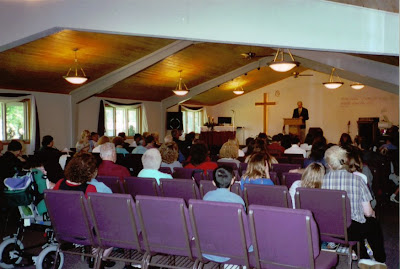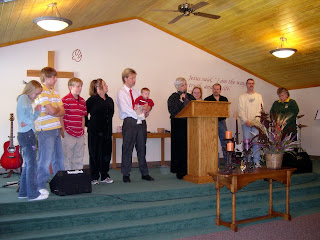My
cyber friend
Dr. Platypus, recently linked to
this post from "Per Christum," and asked for comments from Pentecostal/Charismatics among others. I decided to cut and paste from Per
Christum since my response might be too long for D.P.'s comment box. The post is from a Catholic charismatic perspective, so I did not paste each point completely.
First off, the original post says these dangers (listed below in italics) are "inherent in the charismatic movement." That made me uneasy, because Webster defines
inherent as: "involved in the constitution or essential character of something." These errors are very real, and I've seen all of them, but I do not believe that they are part and parcel of our theology, nor that they are unavoidable, nor part of the essential character of Pentecostal church practice. Any branch of Christianity has potential pitfalls to avoid. And sometimes in the past education and sound scholarship was downplayed in the Pentecostal denominations. I rejoice that this is becomming less and less the case.
That said, Dr. P. asked if these are seen as
dangers, and I answer with a resounding "yes." Perhaps I will open a can of worms I don't want to deal with when I say that IMO these problems are more pronounced in "independent charismatic" congregations where accountability is sometimes greatly lacking and the pastor has the final word on everything.
There are some wonderful independent congregations and pastors out there, so I don't want to paint them all with the same brush, but accountability and structure are things that should be discussed if one is considering attending one of these churches. I could tell some horror stories of what can happen when the pastor thinks he (not usually a "she") speaks for God and no one better say differently. And (sigh) I must be honest and say that I do not rush to a Benny Hinn crusade, do not watch TBN, and yes, I cringe at what I sometimes see in Charismatic Land.
For brevity, I'll use PC for "Pentecostal/Charismatic." On to the list of dangers.

I admit it--this guy scares me.
1. Illuminism - i.e. folks believe God is telling them something unique that nobody else knows. There is a need to feel "special" and if God isn't telling you something unique or even mildly provocative, your credibility as a leader/follower is called into question...
The antidote to this is to teach truth. In my opinion, if it is "unique" it is highly questionable. There is "nothing new under the sun" as Solomon tells us. Accountability is a key. And maturity. A wise pastor or leader will not allow this attitude of charismatic one-upmanship to grow. Sometimes an excited but immature Christian needs to be taught, so it might be time for a loving but serious talk. If it is the pastor....well, that is why independent pastors sometimes scare me. Who takes that guy aside? Who is honest with the pastor? I don't see this attitude much in my fellow AG pastors, at least in this area. As for "pew folks" well, yes. We've had some of these would be "special messengers." In one case we had to remove the person from membership. That was hard, but he refused to listen to any correction. Yep, accountability is a key. But that is true of any church member in any church, though the issues might not be quite the same.
2. . Paraclericalism - a downplaying of the role of clergy, or even suggesting there is no need for the Church hierarchy. I have seen this attitude even among charismatic clergy! There is such an emphasis on the experience of the individual, that any kind of formality or hierarchy is looked down upon.
Well, we aren't much on hierarchy, being a congregation-based fellowship (much like many others in the "free church" tradition such as Baptists or E. Free or Christian and Missionary Alliance, etc. ). Again, teaching is a key. We all have a function in the body. Pastors and leaders equip the saints, but "at the foot of the cross the ground is level." I'm not so sure that downplaying the role of clergy is all bad, but I do dislike the lack of respect for clergy that I see growing evidence for--but not just with Pentecostals.
3. Charismania - attributing excessive significance to the charisms while downplaying other spiritual acts. Speaking in tongues or prophecy become the litmus tests for true spirituality, while feeding the hungry, clothing the naked, etc, are downplayed or even ignored.
Have I mentioned teaching yet? ;-) This is immature belief, practice and behavior. I repeat often at my church that the more "vocal" gifts have NOTHING to do with spirituality. Can we say, MORE PEOPLE WITH THE GIFT OF "HELPS" PLEASE, LORD? And I rejoice to say that I see PC churches becoming more and more aware of the need for loving acts of charity. The Assemblies of God based Convoy of Hope is an excellent example, and one of my favorite organizations.
4. Neglect of Traditional Spirituality - i.e. past spiritual experiences are downplayed or not even studied because it is all about what "I" am experiencing "now."
Yes, this is a significant problem. However, I think it is likely a problem with many churches other than just being unique to PC ones. This lack of awareness of tradition and history seems pretty widespread in the evangelical tradition. There is an excellent video series about church history that I plan on showing....maybe once a month on Sunday night. They aren't dry, not "textbooky" but they do give a wonderful perspective. I'll try to find a link.
5. Tyranny of the Prophetic - This means that the prophetic, in this case referring to the illuminism mentioned above, can trump anything. In other words, if there is an objection to what the pastor is doing, the pastor just reminds the objectors that he talked to Jesus and "God told him..." and that settles it.
I won't be so bold as to say this could not happen, but I do not know of any AG pastor or church where this is the case. Remember, the church people can "vote out" the pastor, unlike some other denominations. You won't find many if any TBN devotees in our clergy ranks either. We are more likely to be chagrined by much of what passes for "Pentecostal." And we spend time correcting the misconceptions that sometimes happen because of high profile (but often self-absorbed or shallow) teachers and preachers. Note: I do not say everyone on TBN is wrong, absorbed nor shallow. But rest assured, TBN personalities do not speak for me nor the pastors I know.
6. Cult of Personality - A cult of personality can develop around the pastor or leader. Despite a general suspicion of traditional hierarchy and church order among some charismatics, the pastor, who has been given special prophetic knowledge, is often viewed idealistically. The result is that he can do whatever he wants without discipline or question, including taking huge sums of money from the congregation.
Wow! Taking money from the congregation? Well, yes, I know of this kind of thing. But (sorry to seem to be whacking on these folks) I see it in independent churches where the board is the family of the pastor, or there is no accountability to anyone, or the pastor owns the building and everything in it. This kind of out-of-control behavior is not as likely to be the case in a church that is part of a larger body. We, speaking of the Assemblies of God, are accountable to our district officials and to the national office. Assemblies of God (and I believe this is true for most other Pentecostal denominations as well) pastors may not own the church. It is the property of the district. If I acted like this example I'd lose my ordination credentials. Yikes! Sometimes I get frustrated with the larger church structure or attitudes, and I don't agree with everything that comes out of Springfield, MO (AG headquarters) by a long shot, but this is one reason I would never try to strike out on my own--though I might be tempted to do so!
The poster at Per Christum concludes, "And while renewal movements often spiritually enliven the Church at times when she needs renewal, all renewal must be subject to the Teachings of Christ in His Church. The Holy Spirit operating in the individual will not contradict the Holy Spirit operating in Christ's Church." I know he is speaking from a Roman Catholic perspective, and I am not, but to me the point is well taken.
In our tradition, the Bible, not the denomination, is the final authority. Look at scripture. Paul severely takes the Corinthian church to task for their self-centered, prideful, undisciplined, immature, charis-maniac behavior! But he still says (my paraphrase), "I think God I speak in tongues more than all of you, but pull it together and use your heads! Love each other and stop acting like arrogant whackos! You can talk in tongues and be the most gifted guy around, and you can even be a martyr and if you don't love each other it is just annoying." He did not tell them to stop being led by the Holy Spirit, or exercising spiritual gifts. He told them to let love and the good of all be their highest aim.
Pride is not only found in PC groups, though it might look a bit different than the same sin in another denomination. Pride and self-centered or immature behavior is the real problem, no matter what the name on the church sign.






















